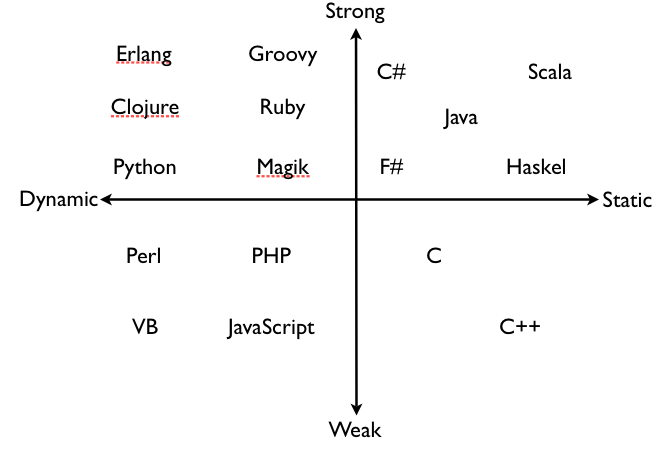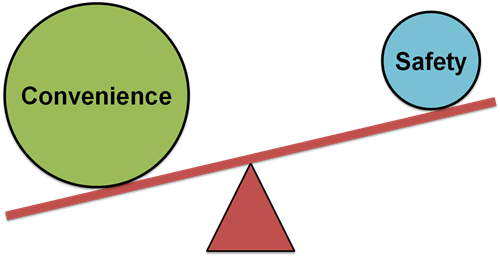Strongly, Weakly, Static and Dynamic typed Language

Strongly typed languages vs Weakly typed languages
A strongly-typed language is one in which variables are bound to specific data types, and will result in type errors if types do not match up as expected in the expression — regardless of when type checking occurs. Python is strong-typed, and so is Java.
temp = "Hello World!"
temp = temp + 10; # program terminates with below stated error
A weakly-typed language on the other hand is a language in which variables are not bound to a specific data type; they still have a type, but type safety constraints are lower compared to strongly-typed languages. PHP is weakly-typed, and so is C.
temp = "Hello World!";
$temp = $temp + 10; // no error caused
echo $temp;
Static typed languages vs Dynamically typed languages
A language is statically-typed if the type of a variable is known at compile-time instead of at run-time. Common examples of statically-typed languages include Java, C, C++, FORTRAN, Pascal and Scala.
In Statically typed languages, once a variable has been declared with a type, it cannot ever be assigned to some other variable of different type and doing so will raise a type error at compile-time(some IDE’s generally shows a Red Cross mark denoting the error).
int data;
data = 50;
data = "Hello World!"; // causes an compilation error
A language is dynamically-typed if the type of a variable is checked during run-time. Common examples of dynamically-typed languages includes JavaScript, Objective-C, PHP, Python, Ruby, Lisp, and Tcl.
In Dynamically typed languages, variables are bound to objects at run-time by means of assignment statements, and it is possible to bind the same variables to objects of different types during the execution of the program.
data = 10;
data = "Hello World!"; // no error caused
Python is strongly, dynamically typed.
Strong typing means that the type of a value doesn't change in unexpected ways. A string containing only digits doesn't magically become a number, as may happen in Perl. Every change of type requires an explicit conversion. Dynamic typing means that runtime objects (values) have a type, as opposed to static typing where variables have a type.
Duck typing (Dynamic typing)
Duck typing is a concept related to dynamic typing, where the type or the class of an object is less important than the methods it defines. When you use duck typing, you do not check types at all. Instead, you check for the presence of a given method or attribute. The object's type itself is not important. Rather, the object should support all methods/attributes called on it. For this reason, duck typing is sometimes seen as "a way of thinking rather than a type system".
In duck typing, we don't declare the argument types in function prototypes or methods. This implies that compilers can't do type checking. What really matters is if the object has the particular methods/attributes at run time. Duck typing is therefore often supported by dynamic languages. However, some static languages are beginning to "mimic" it via structural typing.
What's the origin of the phrase "duck typing"?
If it walks like a duck, swims like a duck, and quacks like a duck, then it probably is a duck.
Even a non-duck entity that behaves like a duck can be considered a duck because emphasis is on behaviour. By analogy, for computing languages, the type of an object is not important so long as it behaves as expected. This behaviour is defined by the object's methods/properties/attributes while expectations are set by those who invoke the methods/properties/attributes.
For example, a Book class is expected to have an attribute numPages and a method getPage(number), where number is an integer. Let's say a function searchPhrase(book, phrase) is meant to search for a given phrase in a book. This function calls book.getPage() for all book.numPages of the book. A Newspaper is obviously not a book but with duck typing this doesn't matter. If Newspaper has implemented numPages and getPage(number), it can be passed into searchPhrase(book, phrase) as if it's a book. Though it's not a book, it's sufficient that it behaves like one within the context of searchPhrase.
What languages support duck typing?
Python and Ruby support duck typing, both of which are dynamic typed languages. In general, dynamic typed languages such as JavaScript and TypeScript support duck typing. While C# doesn't, some parts of .NET use duck typing.
What's the advantage of having duck typing?
